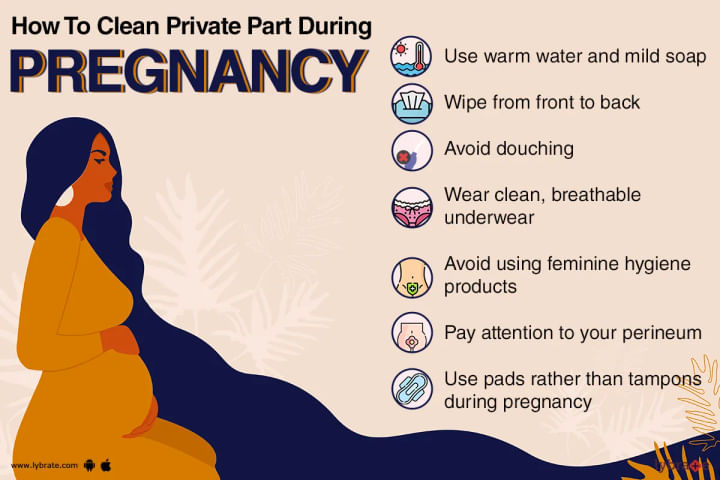How to clean private part during pregnancy
As a pregnant woman, maintaining good hygiene is crucial for the health and well-being of both you and your baby. Taking care of your intimate area is an important part of this. From increased vaginal discharge to the risk of infections, pregnancy can bring about many changes to your body. That's why we've put together this guide on how to clean your private parts during pregnancy. Follow these tips to keep your intimate area clean, healthy, and comfortable throughout your pregnancy.
Use warm water and mild soap
It's crucial to clean your intimate area with warm water and a light, unscented soap. The equilibrium of germs in your vagina might be upset by hot water, which can irritate your skin. Avoid using harsh soaps or products with overpowering scents since they might irritate your vagina and throw off its pH balance.
Wipe from front to back
From front to back, wipe After using the bathroom, wipe your anus from front to back to stop bacteria from spreading to your vagina.This will help to keep your vagina clean and prevent the risk of infections.
Avoid douching
Douching is the practice of using a liquid solution to clean the inside of the vagina. As it may disturb the delicate balance of microorganisms in the vagina and raise the risk of infections, it is not advised during pregnancy. The vagina naturally cleans itself, thus douching is not necessary to maintain cleanliness.
Wear clean, breathable underwear
Wearing clean, breathable underwear can help to keep your intimate area clean and healthy. Avoid wearing tight or synthetic underwear as they can trap moisture and bacteria, increasing the risk of infections. In order to maintain your intimate area clean and odor-free, it's also crucial to change your underwear frequently.
Avoid using feminine hygiene products
Feminine hygiene products, such as sprays and wipes, are not necessary for maintaining good hygiene during pregnancy. Chemicals in these products have the potential to irritate skin and upset the normal balance of microorganisms in the vagina. It is best to stick to using warm water and mild soap to clean your intimate area.
Pay attention to your perineum
During pregnancy, the skin around the vagina (called the perineum) can become stretched and prone to irritation. To avoid infections, it's crucial to keep this area dry and clean. After going to the bathroom, gently pat the perineum dry with a clean, soft towel. Avoid using scented products on the perineum as they can cause irritation.
Use pads rather than tampons during pregnancy
It is generally recommended to use pads rather than tampons during pregnancy. Tampons can increase the risk of toxic shock syndrome (TSS), a rare but serious condition that can occur during pregnancy. Pads are a safer alternative as they do not carry the same risk of TSS.
Consult with your healthcare provider
It is completely normal for pregnant women to experience changes in their intimate area, including increased vaginal discharge and swelling. These changes are caused by the increased blood flow and hormone production during pregnancy. While it is important to maintain good hygiene during pregnancy, it is also important to be gentle and avoid harsh or abrasive cleaning techniques.
One common concern during pregnancy is the risk of developing a yeast infection. Yeast infections are caused by an overgrowth of the fungus Candida and can cause symptoms such as itching, burning, and discharge. Pregnancy can increase the risk of developing a yeast infection due to the changes in hormone levels and pH balance in the vagina. To prevent a yeast infection, it is important to keep the area clean and dry and to avoid wearing tight or synthetic clothing. If you are experiencing symptoms of a yeast infection, it is important to consult with your healthcare provider as they can recommend treatment options.
It is also important to be aware of the risk of sexually transmitted infections (STIs) during pregnancy. STIs can be harmful to both you and your baby and can be transmitted through sexual activity or by sharing contaminated objects. If you are pregnant and have had unprotected sex or are concerned about the risk of STIs, it is important to speak with your healthcare provider. They can recommend testing and treatment options to protect the health of you and your baby.
While maintaining good hygiene is important during pregnancy, it is also important to practice self-care and listen to your body. If you are experiencing discomfort or irritation in your intimate area, it is important to seek the advice of a healthcare provider. They can provide guidance on how to care for your body during pregnancy and address any concerns you may have.
Conclusion
In summary, maintaining good hygiene during pregnancy is important for the overall health and well-being of both you and your baby. By following the tips outlined above and seeking the guidance of a healthcare provider, you can keep your intimate area clean and healthy during pregnancy.



+1.svg)
